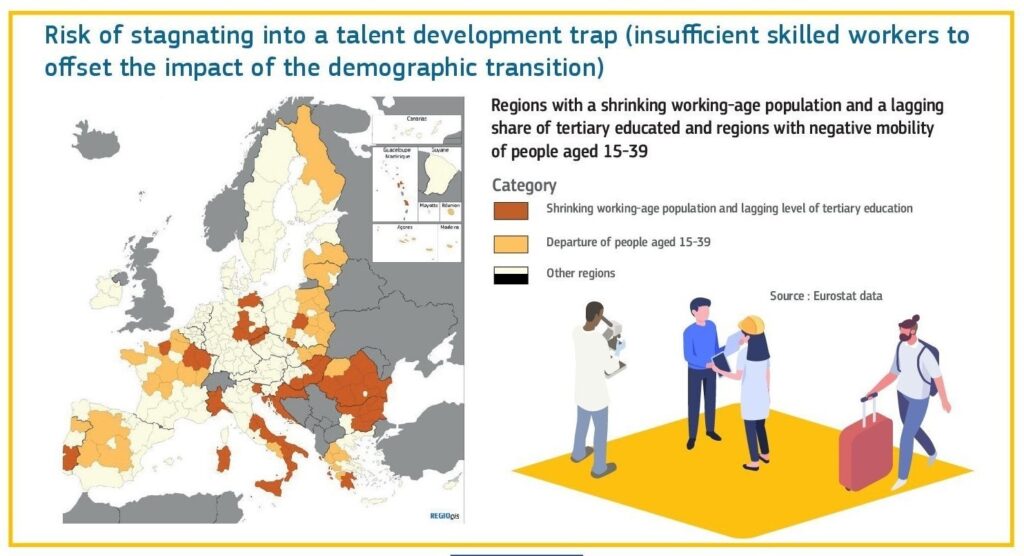Which Greek regions are "red" on the European map - The Talent Enhancement Mechanism and the projects that Greece can claim - Two billion euros available in total for the regions
The European Commission calls it the "talent development trap". This is the phenomenon where more skilled workers are needed to offset the effects of the demographic transition.
In total, 82 regions of the European Union (i.e. the regions hosting almost 30% of the European population ) are affected by the following:
- rapidly shrinking workforce
- low rate of tertiary education
- youth flight.
At the same time, the working-age population in the EU decreased by 3.5 million people between 2015 and 2020 and is expected to decline by a further 35 million people by 2050.
All this forms an explosive cocktail that threatens the development and prosperity of many regions of Europe and can lead to a social, economic and cultural gap, with regions of many speeds, even within the borders of the member states.
Where is Greece located - The "red" areas
To address the problem, the Commission started with a record of the labour force situation in the European regions.
Collected and processed data related to:
- shrinking of the working-age population and a lag in the level of higher education, to depict which he used the colour red
- flight of people aged 15-39, in yellow
In the resulting map, two regions of Greece were red:
- most of the Peloponnese, and
- the Ionian Islands.

"The most 'advanced' region of Greece regarding human resources is Attica. The rest of Greece is either in the 'red' or in the 'yellow', Dimitris Panopoulos, head of the group of experts for the Talent Boost Mechanism of the European Directorate-General DG Region, explains to NewMoney.

"This means a lack of workers, not only unskilled and artisans but also executives, for positions that require greater expertise and professional experience. They are areas where measures must be taken to increase the mobility of talents and to strengthen them with staff that will come not only from the country's interior or from other European countries but also to attract workers from third countries," he said.
Talent Enhancement Mechanism
With this goal in mind, the European Commission set up the "Talent Boost Mechanism", a set of actions based on eight pillars that can make available funds to the European regions exceeding 2 billion euros.
"It is a huge opportunity for Greece," emphasises D. Panopoulos. "The Greek regions can participate with proposals in the sectors of manufacturing, new technologies, smart materials, smart food and others."
"Through the Mechanism, university spin-offs or research laboratories can be financed so that they can manage to ripen their research commercially and introduce it to the market or claim new funding from other bodies. The transition from the laboratory and research arm to the real economy will be financed.
"Also, the Greek regions - in cooperation with regions of other EU states - can apply good practices from collaborative schemes with the development of new jobs, mainly for young people and women, which will have an implementation horizon of at least four years."
In addition to a physical presence, regions can also attract talent online, enabling them to work remotely on a project.
The advantages of the Greek regions for utilising the Mechanism include the fact that Greece has recorded progress in attracting digital nomads to the various areas of the country.
The Facility also provides direct financial assistance to stimulate innovation and high-skilled jobs, calls for innovative actions under the "European Urban Initiative", and improves analytical knowledge to support evidence-based policies for regional development and immigration.
Simela Touchtidou is a columnist for New Money.
READ MORE: IMF: Greece’s economic prospects improved, 2.1% growth in 2024.


